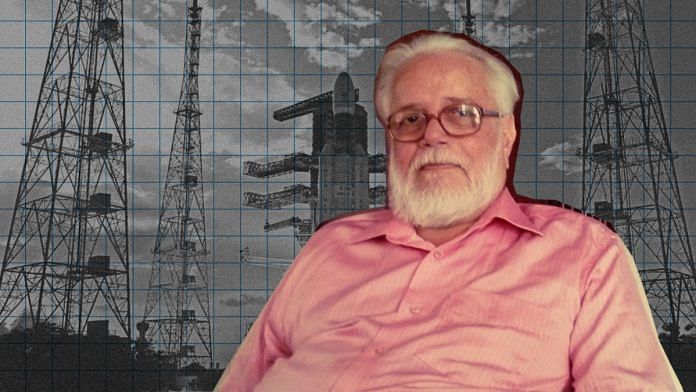The Supreme Court Friday directed the Kerala government to give ex-ISRO scientist Nambi Narayanan Rs 50 lakh as compensation for being falsely implicated as a spy. A fresh probe was also ordered into the role of police officials after the Kerala government closed all the cases against them in 2011.
ThePrint asks: Is SC compensation to ex-ISRO scientist enough or should police be penalised for damage?
Nambi Narayanan’s journey to justice shows poor plight of scientists in India
 Madhavan Nair
Madhavan Nair
Former ISRO Chairman
Finally, the truth has won. Our judicial system has proven that the culprits and not the innocent will be punished. At the same time, the compensation offered is inadequate. This case has been going on for almost 25 years and the legal expenses itself will be Rs 50 lakh or more. Also, Nambi Narayanan had to leave ISRO at an early age, 10 years before he had to retire. Had he continued, ISRO would have benefited by his expertise greatly because he was a top-notch scientist and specialist in the cryogenic propulsion system. The salary Nambi Narayanan would have gotten would itself have run into several crores
Nambi had to fight for his prestige, honour and reputation all alone for a quarter of a century. It shows the poor plight of scientists in India. We are not doing justice to the scientific community. Neither the government nor political parties come to help in such situations.
The government should provide adequate protection to sincere and honest scientists. Look at insurance companies, if there is an accident, they calculate the potential loss to the victim and then award the compensation. Here, not only was there no attempt to find out how much monetary losses Nambi Narayanan incurred but neither did anyone care about his mental agony. How does one calculate that? I remember that in 2001, the Human Rights Commission had ordered Rs 10 lakh in compensation to Narayanan.
I am not happy with the compensation part but am content that Nambi Narayanan’s honour has been restored and his innocence proven.
Compensation to Nambi Narayanan is pittance
 Arup Dasgupta
Arup Dasgupta
Former ISRO scientist
I met Nambi Narayanan very briefly when he was transferred to the space applications centre during the inquiry into the ‘ISRO spy case’. In ISRO, we knew that this was a concocted case. Yet, he suffered for 25 years in the hands of the Kerala Police and IB before the CBI cleared him of all charges.
The so-called compensation he has been given is pittance. Several courts have given such judgments over the past few years to give him compensation, but has he received that money? That is an important question.
It is imperative that the officers and police be investigated for their gross misconduct and those who were responsible be severely punished. There is already a committee that has been set up to investigate police role, and they should do their work thoroughly. The Kerala police officers Siby Mathews, K.K. Joshwa, and S. Vijayan, who probed the case against Nambi Narayanan, should be given the highest level of punishment, including the foreclosure of their pension.
Rs 50 lakh is just a number that cannot compensate for a destroyed career and a traumatised family. Neither can it exonerate the Kerala police and the CIA mole in IB for causing delay to the development of the cryo-engine. The Kerala police personnel, now comfortably retired, need to be given exemplary punishment so that police forces all over India become aware of the consequences of such adventurism. In the current climate, it is all the more necessary. As for the IB operative who was forced to retire, he should be brought back from the US and made to face the music to set an example.
Also read: The fake ‘spy thriller’ that cost Nambi Narayanan his career, life savings and self-esteem
Media hype around Nambi Narayanan case in 1994 similar to today’s mob lynching frenzy
 T.P. Senkumar
T.P. Senkumar
Former DGP, Kerala
The ISRO case was initially investigated by the Kerala Police in the Vanchiyoor Police Station. The real reason behind this investigation was the inquiry conducted into Maldivian people renting houses in Kerala at a high rent. The DPC at the time, Rishi Raj Singh, could not get a good house on rent. It was found that these houses were being taken by Maldivian people. So he asked the Special Branch (SB) to verify the activities of the Maldivian nationals. S. Vijayan, the inspector of the SB, conducted the probe and it led to the identification and case against Mariam Rasheeda, which then led to a new case under the Official Secrets Act. The initial motive, therefore, was not ISRO.
After the CBI investigation into the case in 1996, the government issued orders withdrawing the sanction given to CBI. The government issued orders that I should take over the investigation. I had written to the government on the legal infirmities of such an order. Immediately, Nambi Narayanan who was accused in the ISRO at the time approached High Court in Kerala.
A division bench approved the government order. In few days, the case was taken up by the Supreme Court. There was a stay on further action.
I had no occasion to see the scientists or investigate the case as such. But I was given a list of lapses in the CBI investigation by the initial police team. These were important in nature. Since I had to present an affidavit to the Supreme Court, I had presented these lapses in that.
I cannot say what is the truth but I hope the judicial inquiry can reveal all the facts and truth in this matter.
This case points out the importance of collecting evidence well before making arrests. Moreover, no investigation team can be pressurised by higher-ups, especially through oral orders. Investigating officers should withstand media pressure. While the case was happening in 1994, I was outside the police department and could see the hype in the media each day. It was like the present mob lynching frenzy.
The compensation has to be given. But I hope the truth about conspiracy theories and all other facts come out through the judicial inquiry. Sometimes truth is stranger than fiction.
By Rohini Swamy and Sandhya Ramesh.




The Supreme Court`s attempt to right a wrong suffered by Mr. Nambi Narayanan is welcome. It also proves that the people fall prey to the political, religious machinations endemic in our democratic functioning. What is really worrisome is the media frenzy that assists and covers up these machinations.
It is also expected that our judiciary is impartial and evenhanded in such cases. There are innumerable cases where the highhandness of the State and the unprofessional journalism has caused irreparable damage to the lives of people. The case of acquittal of Chand Mian of Bareilly, Abduk Qayum Mansuri, Salim Shaikh, Abdul Mian Qadri, Abdul Sukeiman Ajmeri and Altaf Hussain of Ahmedabad in May 2014 in Akshardham Temple attack of 2002. The Court not only pulled up the Gujarat Police for framinf innocents but also pulled up the then Home Minister and Chief Minister of Gujarat for non-application of mind. This judgment was ignored by a very large section of the mainstream of India and no concern was shown to these people who had been meted out death sentence in case of the three accused and klife imprisonment. Their cries and suffering went unnoticed and even their approach to the Supreme Court met with inexplicable rejection. I request you to find out the reasons for rejection of their needs for due compensation for the trauma and the hardship they face for over ten years.And in numerous such cases where the acquitted persons have had no wherewithal to approach courts.